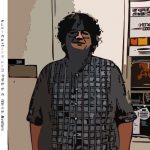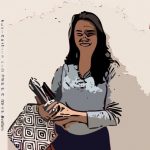Interviewer: Alex Plaumann, First-Year Rhetoric and Writing
Interviewees:



Alex: Why English? What led to you to becoming English graduate students?
Dominik: I started studying English in Austria in 1993 and the love of the language has always stuck with me. I had the opportunity to go to England when I was 16, and something about the language reverberated with me. So after my time in England I wanted to see what the United States was like.
Adrienne: I am an English graduate student because I was an English undergrad, and I knew I wanted to work as an English teacher, or editor or writing. I thought the rhetoric and writing degree could be very interesting and a wonderful way to spend two years. Also, a very concrete step to choosing a career and being very qualified for it.
Layton: I kind of have the generic answer of I loved to read books when I was little, so I ended up going into literature because I wanted to think critically about all the culture I involve myself in. It wasn’t just books; it was movies and stuff like that. I was always that kid that wanted to read deeper into everything, so I became an English major so I could academically delve into and discover the real meaning behind things.
Alex: Why UTC?
Adrienne: I did undergrad in the area and wasn’t sure if I wanted to stay here but there were a number of reasons why UTC was attractive. I don’t believe in killing yourself in going into major loads of debt for graduate education so I loved UTC as a place I already had connections. It’s a good program and a place where I could get a tutorial assistantship and not be suffering to make this happen financially. On top of that, I have really started to love this school more and more and have loved the professors I have worked with.
Dominik: I started my MA program at Ohio University in Athens, and my wife got a job here, so I was able to transfer to UTC.
Layton: I choose UTC because it is such an amazing area. You can partake in outdoorsy activities and it’s amazing because it’s this dual city, you have the outdoorsy stuff but you also have the technological, you have the fiber optics. That’s another reason I came out here. You have the crazy-fast Internet business that’s starting to boom around here, and it’s just a really nice area for anyone whether you’re a techie or outdoorsy.
Alex: What is your coursework like for this semester?
Adrienne: I am taking English 5000, which is Methodology and Bibliography in Graduate English studies. That class is actually awesome because it’s teaching me the completely new way I need to approach academics at the graduate level. It’s a completely different way to do research and also how to write and understand the scholarly conversation that’s happening. Another class I am taking is the first half of rhetorical history. It’s really interesting because we are still in the ancient Greek and Roman rhetoric time periods, but I am learning a lot about how long these things have been around and how we can situate ourselves in the historical context. So that’s the harder one because it’s very theoretical, but it’s still a lot of fun. My last class is Writing Essays for Publication, which is cool because it’s very practical, and we are looking at how to create a graduate magazine and will be creating a graduate magazine [in the Spring]. So we are looking at the history of magazines, how to write magazines and how to get things published. So that’s actually incredible for me because I have only written academically, and this kind of stretches me to see writing and editing as more than academic writing.
Layton: So I am a literature specialist here. But I think one of the good things is there is enough freedom in going down your specific track that you can indulge yourself in the different areas. For example, I have taken a lot of rhetoric classes even though I am in literature, and I get a lot of this cool exposure to rhetorical thinking that I can also apply to a lot of the literary theory I have been studying. It ends up giving me a deeper ability to analyze and write papers.
Dominik: This semester I am taking Authors, Intentions, and American Fiction, which is really theory heavy. I’m taking History of Rhetorical Theory I: Ancient Greece to Renaissance, and I’m taking Matthew Guy’s Theory and Criticism. I think they mesh well together. It is a really theory heavy semester, but I think as a professional in the field you should know what theory floats around. I am also in the literary track, and I like the opportunity that I have to expand my expertise a little bit, so I am taking rhetoric classes as well and think I will have a more well rounded perspective on the field of English after this semester.
Alex: What opportunities have come your way through UTC’s Graduate English Program?
Layton: I have had the great opportunity of being a tutorial instructor. It really helps with being a grad student here. It’s a great opportunity because to give you the chance to teach and impart the knowledge you have gained here to other and sort of giving back to the academic academy and giving back to other that need the help.
Dominik: I think one of the greatest opportunities was to be able to work as an assistant here to teach English tutorials here which I believe is a great way gain a cultural understanding in the specific university setting because UTC is quite different from Ohio University, but I love the atmosphere here … being able to get first-hand experience with the student body and getting involved in student life.
Adrienne: Definitely the tutorials have been a huge opportunity. I have had the opportunity to get teaching experience and also explore the different areas I might want to go into. I’m in a magazine writing and editing class so that has helped me explore that area and see myself in those fields. Of course, teaching and also my classes that are heavy in theory and research make me consider what it would be like to get my Ph.D.
Alex: Can you tell me more about the tutorials?
Adrienne: I have loved the tutorials so far. I am mostly leaning toward wanting to teach, and I actually interviewed for a job right out of undergrad about teaching at a private high school, but I didn’t get the job because I had no experience. So this great because it gives me the opportunity to go through two years to get a Masters degree that could make a huge difference in getting a job in education. On top of that, being able to say that I have two years of teaching at the college level could well be the deciding factor on whether or not I get a job. It also has just given me a ton of practical experience and has helped me sharpen up my writing by tutoring students.
Dominik: It got me back into teaching again after having to take a year hiatus. I think the tutorials are a great way to get back into teaching a class because it has the great advantage of not having to grade at the moment. But mainly getting first-hand involvement with a specific student body is priceless.
Alex: Any further plans to continue your education to the Ph.D. level?
Dominik: I am planning to just get my masters. I think with a masters I can work as an adjunct or as a lecturer, and this is a path I want to take because I have always wanted to teach more than being research-focused.
Layton: I am going to go on for a Ph.D., but in today’s world, I feel like you have to go where the wind takes you. So, that’s one of my goals, but I don’t know how immediately I will get to it.
Alex: What about any additional career goals?
Dominik: If there way an opportunity to teach literature courses in medievalism I would love that opportunity. But I am pretty flexible for what the market demands be it teaching freshman composition or German since I am I trained language teacher.
Layton: I do want to teach to some degree. I don’t know exactly how or where, but tutorials have been a part of seeing what it’s like to be an instructor.
Adrienne: At this point, what I think I will do immediately after graduating is to go on to teach at the secondary level for a while. I would love to teach at a private high school because I am someone who loves the content area. I would hope this would give me a basis of being able to teach composition well. So that’s what I would like to do right out of grad school.
Care to share your stories about being an English graduate student? Please share in the Comments.
Leave a Reply